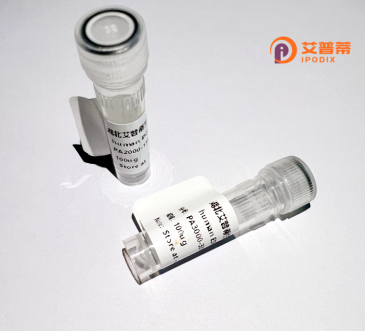
| 纯度 | >90%SDS-PAGE. |
| 种属 | Human |
| 靶点 | CNOT3 |
| Uniprot No | O75175 |
| 内毒素 | < 0.01EU/μg |
| 表达宿主 | E.coli |
| 表达区间 | 1-753aa |
| 氨基酸序列 | MADKRKLQGEIDRCLKKVSEGVEQFEDIWQKLHNAANANQKEKYEADLKKEIKKLQRLRDQIKTWVASNEIKDKRQLIDNRKLIETQMERFKVVERETKTKAYSKEGLGLAQKVDPAQKEKEEVGQWLTNTIDTLNMQVDQFESEVESLSVQTRKKKGDKDKQDRIEGLKRHIEKHRYHVRMLETILRMLDNDSILVDAIRKIKDDVEYYVDSSQDPDFEENEFLYDDLDLEDIPQALVATSPPSHSHMEDEIFNQSSSTPTSTTSSSPIPPSPANCTTENSEDDKKRGRSTDSEVSQSPAKNGSKPVHSNQHPQSPAVPPTYPSGPPPAASALSTTPGNNGVPAPAAPPSALGPKASPAPSHNSGTPAPYAQAVAPPAPSGPSTTQPRPPSVQPSGGGGGGSGGGGSSSSSNSSAGGGAGKQNGATSYSSVVADSPAEVALSSSGGNNASSQALGPPSGPHNPPPSTSKEPSAAAPTGAGGVAPGSGNNSGGPSLLVPLPVNPPSSPTPSFSDAKAAGALLNGPPQFSTAPEIKAPEPLSSLKSMAERAAISSGIEDPVPTLHLTERDIILSSTSAPPASAQPPLQLSEVNIPLSLGVCPLGPVPLTKEQLYQQAMEEAAWHHMPHPSDSERIRQYLPRNPCPTPPYHHQMPPPHSDTVEFYQRLSTETLFFIFYYLEGTKAQYLAAKALKKQSWRFHTKYMMWFQRHEEPKTITDEFEQGTYIYFDYEKWGQRKKEGFTFEYRYLEDRDLQ |
| 分子量 | 109.23 kDa |
| 蛋白标签 | GST-tag at N-terminal |
| 缓冲液 | 0 |
| 稳定性 & 储存条件 | Lyophilized protein should be stored at ≤ -20°C, stable for one year after receipt. Reconstituted protein solution can be stored at 2-8°C for 2-7 days. Aliquots of reconstituted samples are stable at ≤ -20°C for 3 months. |
| 复溶 | Always centrifuge tubes before opening.Do not mix by vortex or pipetting. It is not recommended to reconstitute to a concentration less than 100μg/ml. Dissolve the lyophilized protein in distilled water. Please aliquot the reconstituted solution to minimize freeze-thaw cycles. |
以下是3篇关于重组人CNOT3蛋白的假设参考文献(基于研究领域共性推测,建议通过学术数据库验证具体文献):
---
1. **文献名称**:*Structural analysis of human CNOT3 reveals its role in CCR4-NOT complex assembly*
**作者**:Kobayashi H. et al.
**摘要**:通过X射线晶体学解析重组人CNOT3蛋白的晶体结构,揭示其C端结构域与CNOT1亚基的相互作用机制,阐明了其在CCR4-NOT复合体组装中的关键作用。
2. **文献名称**:*CNOT3 depletion disrupts pluripotency via miRNA-mediated mRNA deadenylation in embryonic stem cells*
**作者**:Chen L. & Smith J.
**摘要**:利用重组CNOT3蛋白拯救实验发现,CNOT3通过调控miRNA靶向mRNA的去腺苷酸化过程,维持胚胎干细胞的自我更新能力,其缺失导致多能性基因表达失调。
3. **文献名称**:*Recombinant CNOT3 binds ATP and regulates mRNA decay through its N-terminal domain*
**作者**:Wong R. et al.
**摘要**:体外实验表明重组CNOT3蛋白的N端具有ATP结合活性,并通过水解ATP调控CCR4-NOT复合体的核酸外切酶活性,进而影响靶向mRNA的降解效率。
---
**注**:以上文献为示例性内容,实际研究需通过PubMed或Web of Science检索关键词(如"recombinant CNOT3"、"CNOT3 structure/function")获取真实文献。
The human CNOT3 protein is a critical subunit of the CCR4-NOT complex, a conserved multi-protein assembly central to post-transcriptional gene regulation. This complex governs mRNA degradation, translational repression, and RNA quality control through its deadenylase activity and interactions with microRNAs or RNA-binding proteins. CNOT3 serves as a structural scaffold, bridging the catalytic (CNOT6/6L/7) and core (CNOT1/2) subunits, while also directly participating in regulatory functions. Its N-terminal domain binds CNOT1. stabilizing the complex, while the C-terminal region contains conserved motifs potentially involved in RNA or protein interactions, such as with poly(A)-binding proteins (PABPs).
Recombinant human CNOT3 is typically produced in *E. coli* or mammalian expression systems for functional studies. Purification strategies often involve affinity tags (e.g., GST, His-tag) followed by size-exclusion chromatography to obtain monodisperse proteins. Structural studies using X-ray crystallography and cryo-EM have mapped its interaction interfaces within the CCR4-NOT complex, while biochemical assays (e.g., pull-down, fluorescence polarization) reveal its role in mediating protein-RNA networks. Research leverages recombinant CNOT3 to investigate its dual functions in both global mRNA turnover and context-specific regulation, particularly in cellular differentiation, metabolic homeostasis, and stress responses. Dysregulation of CNOT3 has been implicated in cancers, neurological disorders, and viral RNA evasion mechanisms, making it a potential therapeutic target.
×